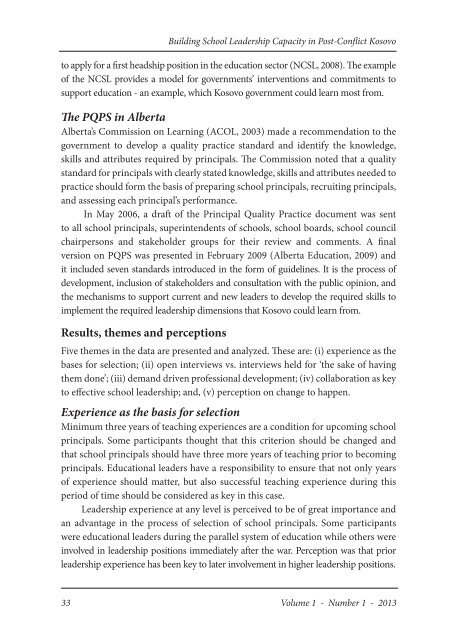Download - qendra per arsim demokratik
Download - qendra per arsim demokratik
Download - qendra per arsim demokratik
You also want an ePaper? Increase the reach of your titles
YUMPU automatically turns print PDFs into web optimized ePapers that Google loves.
Building School Leadership Capacity in Post-Conflict Kosovoto apply for a first headship position in the education sector (NCSL, 2008). The exampleof the NCSL provides a model for governments’ interventions and commitments tosupport education - an example, which Kosovo government could learn most from.The PQPS in AlbertaAlberta’s Commission on Learning (ACOL, 2003) made a recommendation to thegovernment to develop a quality practice standard and identify the knowledge,skills and attributes required by principals. The Commission noted that a qualitystandard for principals with clearly stated knowledge, skills and attributes needed topractice should form the basis of preparing school principals, recruiting principals,and assessing each principal’s <strong>per</strong>formance.In May 2006, a draft of the Principal Quality Practice document was sentto all school principals, su<strong>per</strong>intendents of schools, school boards, school councilchair<strong>per</strong>sons and stakeholder groups for their review and comments. A finalversion on PQPS was presented in February 2009 (Alberta Education, 2009) andit included seven standards introduced in the form of guidelines. It is the process ofdevelopment, inclusion of stakeholders and consultation with the public opinion, andthe mechanisms to support current and new leaders to develop the required skills toimplement the required leadership dimensions that Kosovo could learn from.Results, themes and <strong>per</strong>ceptionsFive themes in the data are presented and analyzed. These are: (i) ex<strong>per</strong>ience as thebases for selection; (ii) open interviews vs. interviews held for ‘the sake of havingthem done’; (iii) demand driven professional development; (iv) collaboration as keyto effective school leadership; and, (v) <strong>per</strong>ception on change to happen.Ex<strong>per</strong>ience as the basis for selectionMinimum three years of teaching ex<strong>per</strong>iences are a condition for upcoming schoolprincipals. Some participants thought that this criterion should be changed andthat school principals should have three more years of teaching prior to becomingprincipals. Educational leaders have a responsibility to ensure that not only yearsof ex<strong>per</strong>ience should matter, but also successful teaching ex<strong>per</strong>ience during this<strong>per</strong>iod of time should be considered as key in this case.Leadership ex<strong>per</strong>ience at any level is <strong>per</strong>ceived to be of great importance andan advantage in the process of selection of school principals. Some participantswere educational leaders during the parallel system of education while others wereinvolved in leadership positions immediately after the war. Perception was that priorleadership ex<strong>per</strong>ience has been key to later involvement in higher leadership positions.33Volume 1 - Number 1 - 2013


